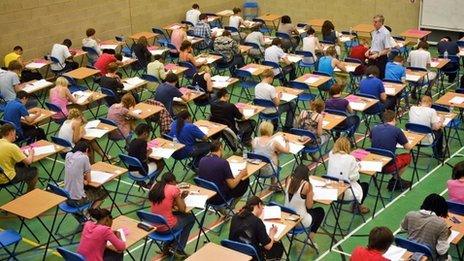Maths confidence gap leaves UK girls trailing, OECD says
- Published

There are warnings about a damaging "gender gap" in maths results in the UK
The maths ability of teenage girls in the UK is on average about three years behind their counterparts in high-performing Shanghai, according to figures from the OECD.
There were particular weaknesses with maths among lower ability girls in the UK, says the study of test results.
The international report warns of the UK's gender gap in maths, with girls trailing behind boys.
It also calls for tougher conceptual maths to be taught in UK schools.
This international comparison of ability in maths is drawn from an analysis of the Pisa tests taken by 15-year-olds.
Gender gap
It shows that across most developed countries, boys are better than girls at maths. At reading, it is the reverse, with girls much better than boys.
This difference in maths is not about any innate differences, says the OECD's Andreas Schleicher.
Instead he says it is driven by a lack of confidence among girls in their maths skills and lower expectations that they will need maths in future careers.
Surveys gathered alongside the Pisa tests show that girls are much more likely than boys to have a perception of themselves as being bad at maths.
"There is a close correlation between expectations and achievement," he said.
In the highest performing education systems, such as Singapore and Shanghai, the gender gap is much narrower.
In all countries there are a range of abilities in maths among pupils. But the OECD says that there is an unusual pattern in the UK with lower performing girls in the UK much worse than might be expected.
These teenagers are the equivalent of about six years behind in their maths skills, compared with the average for schoolgirls in Shanghai in China.
The OECD study looks at the UK as a whole, rather than four separate devolved education systems.
Mr Schleicher says that being good or bad at maths has far-reaching economic consequences for individuals.
People with good maths skills in the UK are six times more likely to have earnings above the median income, he said.
Mr Schleicher also highlighted that "maths" could mean very different levels of learning in different countries - and that this could account for differences in test results.
He said that in schools in the UK there was a tendency for "simple maths wrapped in complex words".
In contrast, he said that in Shanghai there was an emphasis on formal maths and understanding the underlying principles.
England's education minister, Elizabeth Truss, said: "In the past girls have been let down by outdated assumptions about what they are good at but the evidence shows that with excellent teaching and support from parents they are just as good as boys in crucial subjects like maths and physics.
"This is why we are determined to get the message across to girls and their parents that maths skills command the highest earnings in the workplace."
- Published8 March 2013
- Published2 July 2012
- Published3 December 2013
- Published3 December 2013
- Published7 August 2013